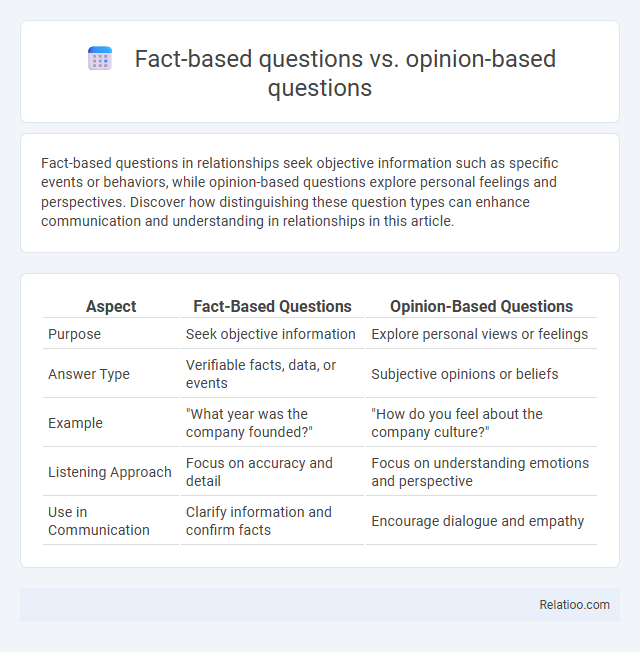Fact-based questions in relationships seek objective information such as specific events or behaviors, while opinion-based questions explore personal feelings and perspectives. Discover how distinguishing these question types can enhance communication and understanding in relationships in this article.
Table of Comparison
| Aspect | Fact-Based Questions | Opinion-Based Questions |
|---|---|---|
| Purpose | Seek objective information | Explore personal views or feelings |
| Answer Type | Verifiable facts, data, or events | Subjective opinions or beliefs |
| Example | "What year was the company founded?" | "How do you feel about the company culture?" |
| Listening Approach | Focus on accuracy and detail | Focus on understanding emotions and perspective |
| Use in Communication | Clarify information and confirm facts | Encourage dialogue and empathy |
Introduction to Fact-Based and Opinion-Based Questions
Fact-based questions seek verifiable information grounded in objective evidence, such as dates, statistics, or historical events. Opinion-based questions invite personal beliefs, feelings, or interpretations, reflecting subjective perspectives rather than definitive answers. Understanding the distinction between these question types enhances critical thinking and improves communication by clarifying whether a response requires factual data or individual viewpoints.
Defining Fact-Based Questions
Fact-based questions require objective answers grounded in verifiable data, such as dates, statistics, or specific events, ensuring clarity and accuracy. These questions facilitate knowledge testing and information retrieval by focusing on concrete evidence rather than personal beliefs. Defining fact-based questions centers on their demand for truth based on measurable or observable phenomena rather than subjective interpretation.
Defining Opinion-Based Questions
Opinion-based questions seek personal beliefs, feelings, or subjective judgments rather than objective facts or verifiable data. These questions encourage expressive responses and vary widely among individuals due to their reliance on personal perspectives, values, and experiences. Unlike fact-based questions that demand concrete evidence or information, opinion-based questions prioritize individual interpretation and emotional insight.
Key Differences Between Fact and Opinion Questions
Fact-based questions demand verifiable, objective answers grounded in empirical evidence or data, such as "What year did the Titanic sink?". Opinion-based questions seek subjective responses influenced by personal beliefs or feelings, like "Do you think the Titanic disaster was preventable?". The key difference lies in factual questions requiring concrete proof, whereas opinion questions depend on individual perspectives without a definitive right or wrong answer.
Importance of Fact-Based Questions in Research
Fact-based questions are crucial in research because they elicit objective, verifiable information that forms the foundation of reliable data analysis and evidence-based conclusions. Opinion-based questions, while valuable for understanding perspectives, can introduce bias and subjective interpretation which may compromise research validity. Your research benefits most from fact-based questions as they ensure clarity, reproducibility, and accuracy in findings.
Role of Opinion-Based Questions in Discussions
Opinion-based questions play a crucial role in discussions by encouraging personal perspectives and deeper engagement. They foster critical thinking and reveal diverse viewpoints, enriching the conversation beyond mere facts. Your ability to navigate these questions effectively can lead to more dynamic and meaningful exchanges.
When to Use Fact-Based vs Opinion-Based Questions
Fact-based questions are essential when accuracy, verification, and objective data are required, such as in scientific research or legal inquiries. Opinion-based questions are valuable for exploring personal beliefs, preferences, and subjective experiences, often used in marketing or social studies to gauge attitudes. Use fact-based questions for clarity and evidence, and opinion-based questions to understand perspectives and motivations.
Common Examples of Fact and Opinion Questions
Fact-based questions seek verifiable information, such as "What is the capital of France?" or "How many continents are there on Earth?" Opinion-based questions explore personal beliefs or preferences, examples include "What is your favorite movie?" or "Do you think climate change is a serious issue?" Understanding the distinction helps you formulate clear inquiries and interpret responses accurately in communication and research contexts.
Challenges in Distinguishing Fact from Opinion
Distinguishing fact-based questions from opinion-based questions poses challenges due to the overlap in language and context where subjective interpretations can appear factual. You must assess the source credibility, evidence, and wording carefully to avoid bias when interpreting answers. Misidentification can lead to misinformation, reducing the reliability of knowledge acquisition and critical thinking skills.
Enhancing Critical Thinking Through Question Types
Fact-based questions provide verifiable information that strengthens a foundation of knowledge, essential for analytical reasoning. Opinion-based questions stimulate evaluative thinking and perspective-taking, promoting deeper engagement and interpretation. Questioning techniques that blend both types foster critical thinking by encouraging comparison, evidence assessment, and reflective judgment.

Infographic: Fact-based questions vs Opinion-based questions
 relatioo.com
relatioo.com